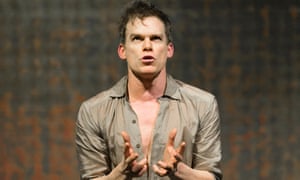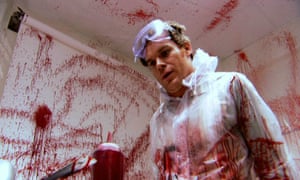Hall didn’t ask him to elaborate; he knew Bowie meant “death”. You can’t shake how strange a constant it has been in the 44-year-old’s life and work. Consider his great TV roles. First, there was HBO’s wonderful Six Feet Under, in which Hall made his name as the tightly wound David Fisher, a mortician in the family’s funeral parlour. Then, his stardom exploded with the Showtime series Dexter, in which he played a droll forensics expert who moonlights as a serial killer of serial killers. And now, Hall is the star of a show bound up, inside and out, with death, immortality and the afterlife. In Lazarus – the David Bowie musical that sold out long before it opened and well before the Starman himself died – Hall plays Thomas Newton, a man who can’t die.
So when he woke up last Monday and learned, via “25 or 30 texts”, that Bowie had passed away, Hall felt a familiar “internal fist clench”.
Handsome and anonymous in a West Village cafe, he balls his right hand and then spreads his fingers wide as he tries to explain: “Some sort of old survival mechanism kicks in. I think it’s about holding on, it’s about mirroring what I see to not be victimised by trauma.” And then these words come out in a quiet rush: “To not be a pitiful, fatherless son.”
When Hall was 11, that fulcrum age of not really child but not quite teenager, he lost his dad to cancer. It is young to experience death, but Hall’s life was coloured by it from the start: his older sister died from congenital heart disease before he was born.
It is easy, in other words, to get pretty heavy – pretty fast – with him.
“It’s all right,” he laughs, “it’s inevitable ...” and he makes a laissez-faire wave. Because, luckily for him, Hall also has a great capacity for silliness. You can see levity in everything he does – in the eyes of that affable murderer Dexter, or in the movement of the leaping but gravity-bound Newton on stage at the New York Theater Workshop.
Before Lazarus, Hall was splattered with glitter on Broadway in the title role of the gender-bending Hedwig and the Angry Inch. “Which served,” he jokes, “as a very elaborate glam audition.” He already had the job before he met Bowie, but when it came time to sing, “I felt the butterflies start turning to bats. And Bowie said,” – Hall affects a voice of self-mocking kingliness – “‘Now sing my songs for me.’”
In other words: “He was sort of naming the absurdity of the moment, which I really appreciated. I think he took pains to put people at ease. He was so generous, and palpably kind.”
Hall began to sing Where Are We Now?, from Bowie’s album The Next Day, facing the pianist, and it wasn’t until he reached the last verse that he became aware of “oohs” coming from the figure in his peripheral vision. He turned and looked. Bowie, eyes closed, was singing the backing vocals.
“And I thought: ‘OK, this is it. I have nothing left to fear.’ And that,” he smiles broadly, “was an amazing day. I kept it together, but when he left, I was alone in the apartment and my legs went out, and I sort of fell to the floor. I’ve never met someone for whom I had such reverence. And the thing about meeting him was not just that I knew him, because I was so familiar with his music, but, because of the resonance of his music and the way it affects anyone who comes to love it, there was a sense that he knew me.”
On opening night, Bowie sent him, “a very, very amazing gift and note. Out of respect for his intense privacy I’ll just say that it was an artefact from his past that he had passed on to me. And it will be a talisman to me for the rest of my life.”
There is a magnificently long pause as Hall seems to internally weigh up whether or not to say more. His forehead creases deeper. Finally, he signals that the thought has been dismissed and we move on.
With yet more Bowie eeriness, the cast were scheduled to record the show’s soundtrack on that Monday of his death. The recording session became a sort of wake.
“I did feel that a part of my work was to empty myself out and let it move through me,” Hall says. “As is often the case when you’re performing, but in this case, all the more so. Since he has passed, there’s probably been a more potent sense of his presence.”
Like countless others, for example, Hall has spent the past few days playingBlackstar on repeat. This, the elegiac album Bowie released two days before his death, includes those lines: “Look up here, I’m in heaven.”
On the table between us are the iPhone and earphones that Hall was listening with when he walked in. He indicates them: “This is what he gave us so I’ll take it. It’s heavy, but it’s soothing.” He uses similar words to describe getting through the show last Tuesday: “So much of what I love about him characterised what I loved about doing the show that night – it was simultaneously heavy and as light as air.”
Hall calls Bowie “dichotomous” – “revealed and impenetrable, and heartfelt and detached. Even his presentation of himself as an alien is what made him so universally relatable to humans. Because we all, in some way or another, feel that way, and – depending on your appetite for airy-fairyness or scientific background – he brought the stardust in.”
If anyone in the cast of Lazarus knew how ill Bowie was, they kept it to themselves. Hall can certainly appreciate the wish to keep such a thing private. At the age of 38, he was diagnosed with Hodgkin’s lymphoma, a form of cancer. He told no one on the set of Dexter, just got the job done and then quietly began chemo the day after filming wrapped on the show’s fourth season. The show ran for a critically acclaimed eight seasons, during which Hall racked up five Emmy nominations. He has a characteristically modest explanation for its success: “Some people like the bad boy and some people like the boy next door, and he sort of manages to present both. So I guess he kind of had that broad spectrum of appeal in his twisted way.”
With awards season looming at the end of 2009, he foresaw a barrage of questions over his conspicuous baldness and so, in January 2010, he released a statement confirming he was undergoing treatment. At the Golden Globes four days later, he wore a knit hat with his tuxedo and when he won best actor he bounded up to the podium to deliver a brief and grinning acceptance speech that made no mention of illness.
“The language surrounding cancer is not language I’m particularly comfortable with,” he says. (He is now in remission.) “This idea of ‘bravely succumbing’ or ‘successfully fighting’ or ‘winning the battle against’ ... I didn’t want to do anything to encourage that language. People say: ‘You beat cancer.’ And it’s like: ‘No, a cocktail of chemotherapy drugs beat cancer.’”
He goes on, scoffing: “When people go get chemo, they’re not injecting themselves with will – I have lost various loved ones to cancer, and I certainly don’t feel that I am any stronger or braver than them.”
He did, however, receive his diagnosis with extraordinary calm.
“There was a sense of bemusement,” he says, “but a sense of, ‘of course’ – y’know? Of course that’s a part of the story.”
He is referring to the fact that, at 38, he was a year younger than his dad had been when he died. The age had always had a morbid significance and so: “I felt justified in what had been a preoccupation with this threshold in my life since age 11 – ‘Well, here I am.’”
Another vast and thoughtful pause before he offers this: “In a way, the relatively sunny picture I had in terms of my prognosis, revealed to me the extent of my survivor’s guilt. I was like: ‘Well, dad had real cancer.’”
There is something familiar about that filial inferiority complex. I’m thinking of the pilot episode of Six Feet Under, in which the closeted Fisher (arguably TV’s first great gay character) has to prepare the body of his own father. Who then appears beside him, a revenant, with this petty paternal put-down: “Oh, no,you’re doing me?”
Hall, who lives in Manhattan with a cat and a dog (he’s been married twice to actor Amy Spanger and then to Dexter co-star Jennifer Carpenter and is now dating Morgan Macgregor, an editor) has experienced similar kinds of psychological communion with his dad.
“I mean, even in the moment when I received the diagnosis, I felt a twinge of connection. I think those are clues that I’ve looked for my whole life. I’m never more encouraged than to hear someone talk about how eerie it is that I move like my father.”
In December, for example, Hall sang Lazarus on the Colbert Show, and when the number ended he stepped back and gestured to the band. Afterwards, his mother told him that in that moment he had looked exactly like his father.
“And that was heartening to me. It’s some sense of not being alone,” he says. “Of being inhabited. In a way that feels good.”
That description could serve for acting itself. Did his grief coincide with his decision to become an actor?
“I think it became all the more of a lifeline for me at that point,” he says. “And the need to escape and the need to process things or confront things indirectly was probably solidified by that trauma.”
Most of his career, though, has been about inhabiting trauma, so much so that I half expect his IMDb page to be spattered with blood.
“I don’t have nightmares about embalming people or killing people or my home planet ...” he says, referencing Six Feet Under, Dexter and Lazarus respectively, “but when so much of your spiritual, psychic, emotional energy is dedicated toward the authentic simulation of some fiction, it affects you in some way. I mean, that’s the tricky thing about playing a character for a long time – you initially feel it’s therapeutic. You’re tilling what would have otherwise been dead soil and airing it out. But after a while, it feels like you’re reinforcing bad habits. I mean, yeah, it was nice to check in with my doormat issues, but after a while I was ready to stop playing David Fisher, you know? Or, it was nice to really explore the degree to which I struggle with my own sense of authenticity, but after a while I was ready to stop playing Dexter.”
Hall once said said that it was only by secrets that he had a sense of himself. It sounds like a rather grave pronouncement, but when I mention it, he sparks into playfulness.
“But we always have one, you know?” He points at me: “You have one! I always try to have one. It could be anything: ‘I’m wearing women’s underwear’ – whatever – or, ‘I killed my family.’”
And that – knickers and homicide, the silly and the deeply dire – seems like a very Michael C Hall pairing. Death comes for us all, even starmen, so let’s put on our red shoes and dance while we can.





No comments:
Post a Comment